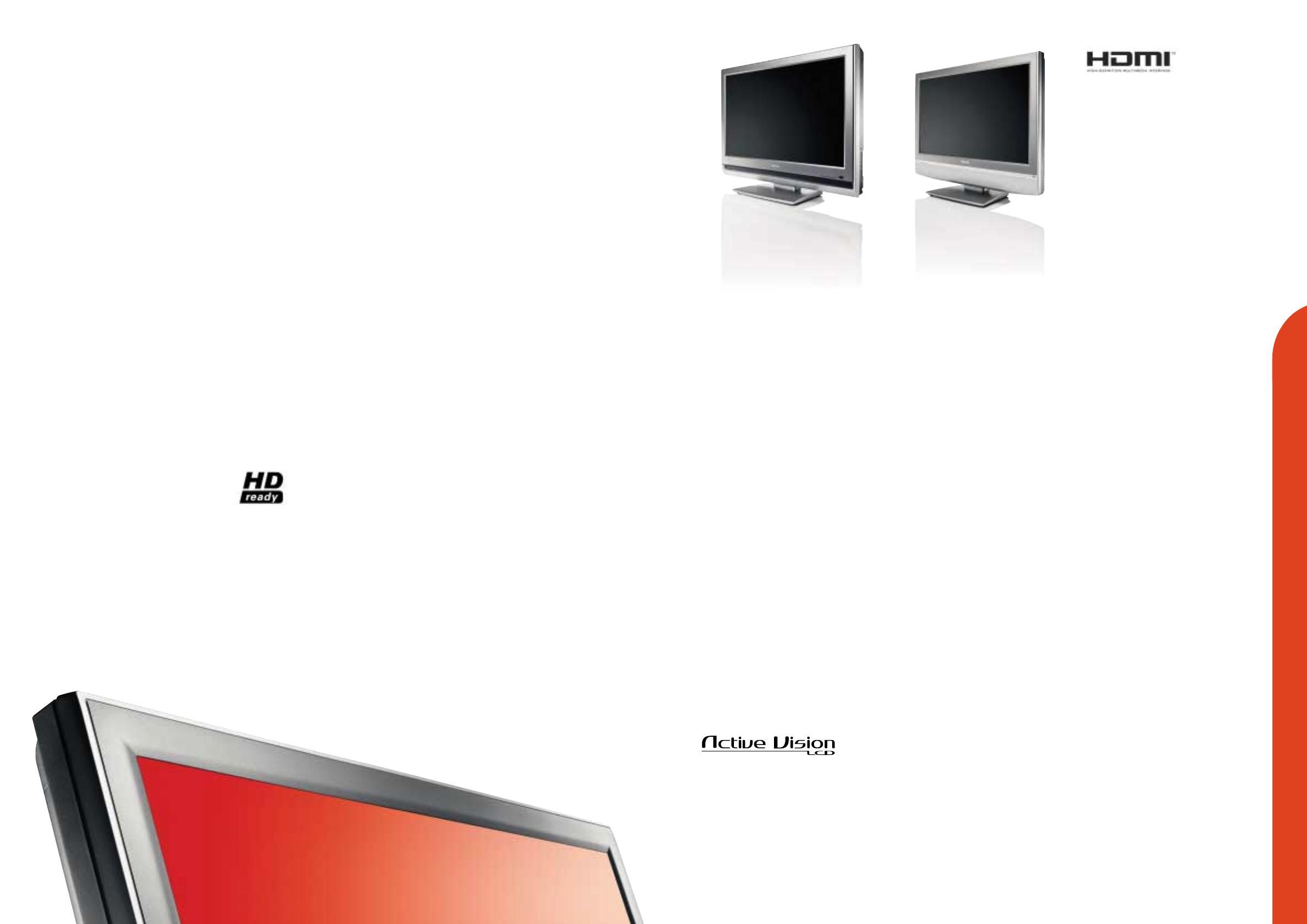
4
Get Ready for HDTV
High Definition TV is coming soon.
For example, in the UK both commercial
broadcasters and the BBC are already
filming some programmes in High
Definition. BSkyB has announced plans
to start HD broadcasts in 2006 while
many movie studios have committed to
producing movies on HD DVD. You will
need an HDTV receiver or HD DVD
player, but most importantly, you will
need a High Definition compatible TV.
What is HDTV?
Very simply, High Definition Television
is a digital system that gives you picture
quality that is vastly superior to current
broadcast systems. The improvement
in clarity, depth and sharpness of
images is instantly visible.
HDTV provides an average of eight
times more data on a display screen
than a standard definition broadcast
thanks to the increased picture
resolution that HD broadcasts deliver.
The Technical Bit
• Current digital TV broadcast system
(PAL) offers 576 active lines of
picture information, sent as an
interlaced signal, reproducing around
210,000 pixels.
• There are three main HDTV
standards: 720p, which offers 720
lines of image, progressively scanned;
1080i, providing 1080 lines of
interlaced image; and 1080p, which
provides 1080 lines of progressively
scanned lines.
• High Definition broadcasts carry two
million pixels of data signal - that’s
around eight times more picture detail
on the HDTV screen versus current
Digital broadcasts.
A new European industry-wide technical
standard has been defined for products
which will be able to display High
Definition images.
Any product featuring this logo
guarantees:
• A minimum native resolution of the
display or display engine (in the case
of DLP projectors, for example) is 720
lines in widescreen format.
• The display will accept HD signals
via component video and DVI or
HDMI interface.
• HD component inputs that will accept
the following video formats:
a) 1280 x 720p and b) 1920x1080i
(at 50 and 60Hz).
• A DVI or HDMI input with HDCP
copy protection support.
Available Now!
Toshiba already has a range of TVs and
projectors capable of displaying High
Definition broadcasts in all their glory
when they are available. In the
meantime, you can make the most of
the products’ high specifications and
their benefits.
High Resolution
The resolution of a screen dictates
the amount of picture information you
will see. The more image data available,
the more detail in the display and the
greater your viewing experience. That’s
why all the widescreen LCD TVs in this
brochure have a minimum panel
resolution of 1280 x 720 (almost 1
million pixels). Potentially each pixel
can display different information,
so enhancing the colour, tone and
ultimately, the three-dimensionality of
the image displayed.
Insight: High Definition TV
INSIGHT: HDTV & SCREEN TECHNOLOGY
5
HD Ready: three high-spec LCD TVs
with high resolution screens, 2x HDMI
and Component Video inputs, plus
integrated digital receivers (p.8)
HD Ready: three striking LCD TVs
with high resolution screens and HDMI
input (p.10)
An industry standard for connecting
high definition components, High
Definition Multimedia Interface™
transmits uncompressed digital video
and audio content over a single cable,
replacing the multiple cables required
with analogue AV connections.
As there is no conversion from digital
to analogue and back again (as with a
SCART lead for example), the original
digital quality is upheld.
HDMI™ dramatically simplifies home
cinema system installation and offers
numerous additional benefits including PC
compatibility, automatic format adjustment,
as well as automatic configuration of the
system to turn on or off the components
necessary to view a DVD, listen to a CD
or watch cable or satellite TV.
As pioneers of DVD and the new HD
DVD technologies, we have shown our
continuing commitment to bringing the
very latest advances in AV technology
into your home for your ultimate
enjoyment. Our latest LCD screens are
packed with image-enhancing
technology such as Active Vision LCD
and Real Digital picture processing, while
our range of DLP™ TVs and projectors
bring the full impact of cinema style
viewing into your living room.
What is Active Vision LCD?
Active Vision is a high performance
picture processing system designed
to produce a stunning picture by
enhancing four core elements of a
television image:
Detail – Active Vision LCD can
reproduce three times more pixels
than a conventional LCD TV.
Colour – Active Vision LCD can
reproduce four times more colour tones
than a conventional LCD TV.
Movement – Using Real Speed
Progressive technology, Active Vision
LCD dramatically reduces jagged
edges on lines and detail during
fast-moving scenes.
Contrast – Active Vision LCD uses a
dynamic contrast enhancer to adjust
contrast levels automatically. While it is
important for an LCD TV to have a high
performance panel, for the best results it
is absolutely essential to have a high
performance picture processing system.
What is Real Digital Picture
Processing?
Real Digital adds yet another dimension
to the picture processing technology by
reducing the number of signal separations
that normally occur in an LCD TV.
Signal processing in current LCD TVs
has to pass through numerous separate
signal conversions before it arrives at
the panel processing chip. This process
dramatically reduces the picture signal
quality of the TV.
Toshiba’s new Real Digital picture
processing reduces the signal
separation stages, therefore
maintaining the original detail of
the signal, and enhancing the
picture performance.
If the HDMI™ interface is used, the
signal is carried directly to the panel
signal processor as a digital signal,
and no picture separation occurs.
Insight:
Screen Technology
Thanks to Digital TV, DVD and High Definition TV, the audio-visual quality of programmes available
is generally far superior to anything we have experienced in the home before. However, you need
to have the right equipment to enjoy this new level of home entertainment.


















